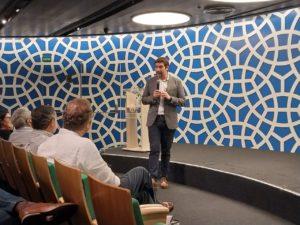(MENAFN- Brazil-Arab News Agency (ANBA))

São Paulo – Companies most advanced in digital transformation are also the ones with the best results in international markets. Production Engineering professor of the Federal University of Rio Grande do Sul (UFRGS), Argentine-born engineer Alejandro Germán Frank (pictured above), said research points to this.“Companies that are digitally transformed, have a well-established digital strategy, and mastered the use of digital technologies perform much better in terms of international markets, be it in exports or operating costs, and all the financial effects this generates,” he said in an interview with ANBA.
Frank is a postdoctoral fellow from the Massachusetts Institute of Technology (MIT) in the United States and also an affiliated researcher. He is the director of the Organizational Engineering Center (NEO) of UFRGS, the university from which he also holds a Ph.D. in Production Engineering and where he is a coordinator of the specialization course in Industry 4.0 and Digital Transformation. The specialist defends whoever works with the international market must be included in the digital world.“It is not possible to think about foreign trade in the 21st century without digital transformation,” he said.

Frank conducted training at the Arab Brazilian Chamber
Tech-savvy and fast-paced markets like the current ones demand fast logistics and product shipping. Digitization is a tool to speed up many foreign trade processes, such as customs clearance and documentation.“We're talking about serving faster the consumers who nowadays can't wait long and can easily find substitutes. When there are many substitutes, competition is between those who deliver the product that best meets what the consumer wants and faster,” he said.
Frank stated the digital economy could be seen in all areas of society, and in the business world, foreign trade, and global production chains, digital transformation is currently the main challenge and requirement.“We have experienced many disruptions and deranges in global production chains, many challenges regarding supply, shipping, and geopolitics; all these struggles have created issues on how chains have been organized,” he said.
Digital modeling has become a tool to deal with these concerns, accelerating decisions, improving processes, and allowing companies to meet demands more quickly. With connected processes, it is possible to visualize each link in the chain and its stakeholders through sharing information, for instance.“When we are talking about a crisis, a war, we can already foresee trade issues at a certain point, and we can, for example, visualize other markets where we can find demands for the same products and visualize what is happening,” Frank said.
How to digitalize?
But what can companies operating in international markets do to progress from analog to digital? The professor recommends aiming at two major areas; technology and structuring. In technology, it is necessary, at first, to digitize processes, become more connected with stakeholders and other agents, and share information in the cloud in organized and shared folders. A more advanced step is to use artificial intelligence to analyze data and support decision-making.
Within the company structure, it is necessary to train personnel for a digital mindset, so they understand what it is about and are open to using technologies in the organization. In addition to digitizing the company's processes, it is often necessary to review them and rethink how transactions are carried out and how customers are served.“Finally, there is the issue of the organizational environment and how the company has built its culture and leadership focused on digital transformation. When we think of digital transformation, we think of something coming from the management, top to bottom. Still, it needs to be a vision of the company because it involves transforming the organization as a whole,” said Frank.
The professor said the biggest challenge for digital transformation in companies, primarily small and medium-sized ones, has been understanding this change is not just for big corporations.“Whenever we think about digital transformation, we believe high investments are needed. Naturally, for those building digital tools to offer to the market, yes, investments are required. Still, companies that will be users and appropriate the technologies in their day-to-day lives often can find relatively affordable solutions on the market,” said Frank.
Arab Brazilian Chamber
Alejandro Germán Frank conducted training for employees of the Arab Brazilian Chamber of Commerce (ABCC) on digital transformation in the company's headquarters in the city of São Paulo this Tuesday (31). The institution recently launched the Ellos Platform , which uses blockchain technology and intends to digitize the entire foreign trade process between Brazil and the Arab countries. Jordan has already started using digital customs clearance through the platform for exports to Brazil. The training was opened by ABCC's president, ambassador Osmar Chohfi, and presented by Marketing & Content director Silvana Gomes, with the participation of Technology and Innovation director Marcos Bulgarelli.
Translated by Elúsio Brasileiro
Isaura Daniel/ANBA
Isaura Daniel/ANBA
The post digital companies perform better in foreign markets appeared first on agência de notícias brasil-árabe .

.jpg)



















Comments
No comment